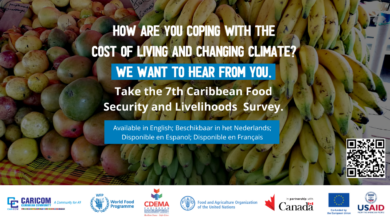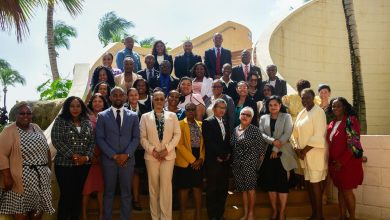(CARICOM Secretariat, Turkeyen, Greater Georgetown, Guyana) The Eighteenth Meeting of the Council for Human and Social Development (COHSOD) which focussed on Education and Health was convened under the theme: “Winds of change: Education and Health collaborating to advance Human and Social Development” was held at the Ritz Carlton, Golf and Spa, Montego Bay, Jamaica, 3-4 June 2009.
In attendance were:
The Hon. John Fabien, Minister of Health and Environment, Dominica and the Hon. Franka Alexis-Bernadine, Minister of Education and Human Resource Development, Grenada who were co-chairs of the Meeting; Hon. H. John Maginley Jr., M.P., Minister of Health, Antigua and Barbuda; Hon. Donville Inniss, Minister of Health, Barbados; the Hon, Patrick Faber, Minister of Education, Belize; Hon. Ignatius Karl Hood, Minister of Health, Grenada; Hon. Rudyard Spencer, Minister of Health, Jamaica, the Hon Andrew Holness, Minister of Education, Jamaica; Hon. Rupert Herbert, Minister of Health, St Kitts and Nevis; Hon. Dr Keith Mondesir, Minister of Health, Saint Lucia; Hon. Dr. Celsius W. Waterberg, Minister of Health, Suriname; Hon. Edwin Toekidjan Wolf, Minister of Education and Community Development, Suriname; Senator the Hon. Jerry Narace, Minister of Health, Trinidad and Tobago and, Hon. Andrew Fahie Minister of Education and Culture, British Virgin Islands and their delegations.
The Netherland Antilles was invited and its delegation was led by the Minister of Education and Culture, Public Health and Social Development, Hon. Mrs Omayra E.V. Leeflang.
Representatives from institutions and organisations including Accreditation Council Of Trinidad And Tobago (ACTT), Caribbean Accreditation For Education In Medicine And Other Health Professions (CAAM-HP), Caribbean Education Sector HIV and AIDS Coordinator Network (EDUCAN), Caribbean Environmental Health Institute (CEHI), Caribbean Epidemiology Centre (CAREC), Caribbean Examination Council (CXC), Caribbean Food And Nutrition Institution (CFNI), Caribbean Health Research Council (CHRC), Caribbean Knowledge And Learning Network (CKLN), Caribbean Regional Drug Testing Laboratory (CRDTL), Caribbean Public Health Agency (CARPHA), Food and Agricultural Organisation (FAO), National Training Agency (NTA), Pan American Health Organisation/ World Health Organisation (PAHO/WHO), Technical and Vocational Education and Training (TVET), United Nations Children Fund (UNICEF) , United Nations Development Fund for Women (UNIFEM), United Nations Economic Commission for Latin America and the Caribbean (ECLAC), United Nations Educational, Scientific and Cultural Organisation (UNESCO), United Nations Population Fund (UNFPA), United Nations Programme on HIV/AIDS (UNAIDS), University of the West Indies (UWI) were in attendance.
OPENING CEREMONY
At the Opening Ceremony there were statements by the Honourable Rudyard Spencer, Minister of Health of Jamaica, the Honourable Andrew Holness, Minister of Education of Jamaica, the Chairman of COHSOD, the Honourable John Fabien, Minister of Health of Dominica and Dr. Don Bundy, Lead Education Specialist at the Human Development Network of the World Bank. Mr Roger Mc Lean Senior Research Fellow/Health Economist HEU, Centre for Health Economics, Faculty of Social Sciences, University of the West Indies, St. Augustine, Trinidad and Tobago made a presentation.
Minister Spencer challenged COHSOD to re-commit to one of its mandates, to promote the improvement of health including the development and organisation of efficient and affordable health services in the Community. He said that “the way forward must include the development of pro-poor health and education policies, a gendered approach to policy-making and strategic regional leadership in health education and health information.”
Minister Holness said it was critical to ensure that health and education remained a priority for governments. He added it was important to improve efficiency, effectiveness and equity in both sectors.
The Chairman called on his Council to help make the case for the Heads of Government of the Community to take a long view of development and for moving to achieve the Millennium Development Goals by 2015 which should include a reduction in the rate of NCDs.
Dr. Bundy said that meetings such as the COHSOD would give the World Bank a chance to learn from the countries of the new challenges which had arisen as a result of the global crisis. He updated the Meeting on the status of financial facilities made available by the Bank to those countries that were most vulnerable to the social shocks arising out of the crisis.
Mr. McLean made a presentation entitled The Global Financial Crisis and its effect of delivery of Health and Educational Status in the Caribbean. In so doing he noted that the present situation came on the heels of a global food crisis and energy prices that reached unprecedented levels in 2007 and 2008.
“This means for many countries they face the dual crisis of unacceptable levels of inflation and unemployment concurrently,” he pointed out, further stating that “it has however been widely acknowledged that the full impact of the recession has not yet been felt.”
Mr. McLean said the crisis was projected to pose a serious threat to the social gains that had been achieved over the last decade as it was projected to push an additional 46 million people below the poverty line over and above the 130-155 million who were there in 2008.
“The World Bank estimates an increase of between 200,000 to 400,000 deaths annually if the crisis continues for developing countries,” he added.
As far as the Region was concerned, Mr. McLean said that based on previous experience the global shocks were likely to be felt through a tightening of external financing conditions, lower demand for regional exports and a severe drop in the terms of trade. “The effects of these shocks are likely to be exacerbated by the existing and inherent volatility of Caribbean territories. This is largely driven by the small size of our economies, our dependence on exports as the key source of foreign exchange and hence our increased reliance on international trade, and the “monocrop” nature of our export sectors,” he stated.
He said the impacts were likely to manifest themselves in greater demand for social safety networks and the resulting depletion in quality of life and its impact on human capital formation were likely to reinforce those structural factors that would see higher levels of poverty and deprivation in subsequent cycles for the Region.
In mitigating the effects of the crisis, Mr. McLean indicated that the Health and Education sectors were key to the strategies required to respond. “If increased productivity is the key to re-energising economic growth and attaining fiscal stability, then the roles of the Health, Education and related Social Sectors are key in ensuring that our principle resource (our Human Resource) is equipped and capable of being a significant net contributor and not a net drain to the Region’s fiscal position,” he argued.
HUMAN AND SOCIAL DEVELOPMENT
COHSOD received a report from the CARICOM Secretariat which fully documented the major intersectoral programmes being undertaken by the Directorate of Human and Social Development. The report highlighted the activities related to climate change, quality assurance in education, healthy lifestyles, improving access to medicines and health systems development including the transition from five regional health institutions to the Caribbean Regional Public Health Agency and the Caribbean Co-operation in Health Initiative III.
In addition, the free movement of people, sport and development, the emphasis on cultural industries and crime and security all provide a platform for inter-sectoral activity. Of significance in this regard is the programme for mainstreaming gender in all the activities.
CARPHA
The COHSOD endorsed the proposal emanating from the Meeting of the CARPHA Steering Committee with respect to the structure, functions and costing of the new entity. In this regard, COHSOD agreed that a resource mobilization team be established to address the broader issues of sustainability of financing of CARPHA. The Meeting also agreed to support the location of the main campus of CARPHA in Trinidad and Tobago.
The Meeting endorsed a timetable for CARPHA’s implementation and the presentation of a plan including costing and the legal agreement to the Inter-Sessional Meeting of Heads of Government in March 2010.
THE H1N1 VIRUS
A Report from CAREC revealed the severity of the H1N1 Virus, globally, classified by WHO as phase 5 moving to phase 6, the highest level. CAREC has tested 362 cases so far of which 32 have been diagnosed as positive in The Bahamas, Bermuda, Cuba, The Dominican Republic and Jamaica. No death has been recorded.
The Report also noted some of the main challenges among which are limited human resource capacity, procurement of supplies, lack of reserves, specimen transfer and specimen contamination.
The Meeting agreed that efforts are to be made under the guidance of Caucus of Ministers of Health and in consultation with PAHO on establishing and sustaining a more effective and efficient Caribbean Laboratory Network.
PAHO
COHSOD agreed to support the framework for defining the subregional co-operation strategy of the Pan American Health Organisation (PAHO) and agreed to provide the necessary feedback for its completion at the Caucus of Medical Officers of Health which would allow for further consultations with other relevant stakeholders such as the CARPHA Steering Committee and the Regional Co-ordinating Mechanism for PANCAP.
CCH III
A report on the Caribbean Co-operation in Health III highlighted the framework for governance and monitoring and evaluation of five priority areas, namely creation of a healthy Caribbean environment, improving care throughout the life cycle, effective health services, development of human resources in support of health development and evidence-based policy.
The Meeting in endorsing the framework, reiterated the need for the CARICOM Secretariat to strengthen its Health Desk. The Meeting also recommended that the CCH III Secretariat should embark on mobilization to support projects and programmes and thereby facilitate the implementation of the framework.
EDUCATION AND HIV AND AIDS
COHSOD recognised the importance of the Port-of-Spain Declaration on Education and HIV and AIDS and noted that several of the recommendations in the Declaration have been or are in the process of being implemented. Among these are training programmes undertaken by the CARICOM Secretariat, with the support of PANCAP, in several communities across the Caribbean, including the inner city areas of Tivoli Gardens in Jamaica, Laventille in Trinidad and Tobago and Albouystown and Linden in Guyana.
The Meeting expressed appreciation for the work of EDUCAN on strengthening the education response to school health, nutrition and HIV and AIDS and noted that there are ongoing programmes using the EDUCAN model in Jamaica and St. Kitts and Nevis which fully demonstrated the extent to which multi-sectoral programmes are important in building capacity.
COHSOD also recommended that a special Information Education and Communication (IEC) programme be implemented in collaboration between CARICOM/PANCAP and World Bank/EDUCAN with outreach to Member States, as a priority.
The Meeting agreed that teaching by testimony and experience as fostered by IEC is a critical method in training and contributing toward the reduction of stigma and discrimination in respect of HIV and AIDS.
COHSOD expressed support for the eight UNAIDS priorities for 2009-10 which includes care, treatment, support, stigma reduction and human rights and recorded its appreciation for the decision of UNAIDS to establish a technical support facility for rapid response support to Caribbean countries.
CARIBBEAN REGIONAL STRATEGIC FRAMEWORK ON HIV AND AIDS
COHSOD applauded the development of the latest version of the Caribbean Regional Strategic Framework on HIV/AIDS (2008-12) and reaffirmed its support for the strategic direction and programme priorities identified for action over the period.
COHSOD also recognised the efforts of PANCAP in seeking to mobilise resources through funding mechanisms such as the Global Fund and the United States President Emergency Plan for AIDS Relief (PEPFAR). Such resources will be applied towards the achievement of both national and regional public good for the benefit of the Pan Caribbean Region.
MODEL CONDOM POLICY
COHSOD received a report on a Model Condom Policy for the Caribbean with key components such as strategic supply management, quality assurance, accessibility, promotion, import duty and taxation, monitoring and evaluation of the policy implementation.
COHSOD noted that PANCAP had endorsed the Model Condom Policy and approved its adoption at the national level within the context of the abstinence – be faithful and condomise (ABC) – policy. It was acknowledged that the ABC approach was a useful combination to support prevention of the spread of HIV.
NON-COMMUNICABLE DISEASES (NCDs)
COHSOD endorsed the plans for the second Annual Caribbean Wellness Day on 12 September 2009 which is a follow up to the Port of Spain Declaration (2007) Uniting to Fight the NCDs. COHSOD agreed that a series of activities will be organised in Member States around a common theme, Love That Body. It was also agreed to place emphasis on implementing five super priorities related to: no tobacco; nutritious foods; physical facilities and widespread engagement in physical activities; engaging the media in information, education and communications; and the establishment of national Committees to co-ordinate activities associated with a Wellness Revolution.
REGISTRATION OF CUBAN MEDICAL PRACTITIONERS OF CONTRACT TO CARICOM GOVERNMENTS
Ministers supported the recommendation for a model approach to professional registration of Cuban Medical Practitioners serving within bilateral technical cooperation agreements as follows:
“That provisional or institutional or special registration be utilized to register Cuban professionals as they do not automatically qualify for full registration in the sub-region. The requirement of English language proficiency will remain in place to be determined by the local authority.”
PORT-OF-SPAIN DECLARATION
The Meeting agreed that the Port-of-Spain Declaration is directly related to school health and in that regard called for attention to be given to risk factors, obesity, physical activity, healthy diet and tobacco control.
COHSOD reaffirmed commitment to tobacco regulation.
The Meeting noted the examples of facilities for encouraging healthy lifestyles that are in place in several countries of the Caribbean and urged that such facilities should become more widespread.
COHSOD noted that linked to the implementation of the Declaration is a series of programmes being undertaken under the sponsorship of several institutions. Among these are: the utilisation of the Healthy Schools Approach to address risk factors which include a behaviour risk survey undertaken by PAHO; models for school feeding by the Caribbean Food and Nutrition Institute (CFNI); promoting physical education in schools co-ordinated by the CARICOM Secretariat and promoting networks of Health-promoting schools led by PAHO.
The overall objective of this series is to strengthen the capacity of Member States for organisation, development, implementation and monitoring and evaluation of comprehensive school health programmes.
HEALTH-PROMOTING SCHOOLS
COHSOD agreed to support the advancement of Health-promoting Schools Initiative including the reactivation of the Caribbean Health-promoting Schools Network.
COHSOD underscored the importance of an integrated approach through the Health and Education sectors to address the negative outcomes being witnessed especially during the adolescent and pre-adolescent years. The Meeting noted the growing trend towards obesity and type 2 diabetes in this age group and emphasised the promotion of the school as a healthy environment.
The Meeting noted that the emerging profile of the Caribbean adolescent is increasingly characterised by a sedentary lifestyle and consumption of foods high in fat content and low in nutritional value.
COHSOD emphasised that issues of students’ health should be considered not only in terms of eventual health outcomes but just as importantly in terms of the reduced cognitive outcomes that result from poor health.
In relation to those issues, COHSOD considered the specific issues of school feeding and physical education. The data presented highlighted the fact that in many instances planning for school meals was not done on a scientific basis and practices related to safety, storage and distribution needed a major overhaul.
COHSOD considered the role of physical education at all levels in addressing the concerns of adolescent health and noted that the successful implementation of the Regional Framework for Physical Education required training of teachers and a commitment to provide not only equipment but also to accord the necessary importance through adequate time tabling.
COHSOD also noted that innovative methods of providing physical education such as dance needed to be explored.
The Meeting agreed to the development of a plan for an integrated approach to school health by adapting the regional strategic framework and further agreed that a global survey on health-promoting schools be carried out in as many CARICOM Member States as possible.
COHSOD emphasised systematic approaches for School Feeding and Physical Education as critical for promoting a Healthy School environment.
MEDICAL ACCREDITATION
COHSOD received a report from the Caribbean Accreditation Authority for Education in Medicine and Other Health Professions (CAAM-HP) and acknowledged the Authority’s achievements in the accreditation of the medical and veterinary education programmes of the universities in Member States and looked forward to progress in accrediting education programmes of Dentistry and other health professions.
GENDER ISSUES AND EDUCATION
COHSOD considered issues pertinent to Gender and Education and in particular the issue of Boys’ Under-participation and Underachievement in the Education System. The Meeting acknowledged the complex nature of the issues involved and took into account the situation in the wider society and economy which might contribute to the continuing challenge.
COHSOD mandated the convening of a Policy Forum in 2009 to consider the findings of and make recommendations for actions at the national and regional levels based primarily on the CDB funded study on Gender Differentials in Education spearheaded by the Regional Co-ordinating Unit of the Centre for Gender and Development Studies, UWI, Mona.
CARIBBEAN VOCATIONAL QUALIFICATIONS (CVQ)
COHSOD considered developments with regard to the roll-out of the Caribbean Vocational Qualifications in schools. The qualification is issued by the Caribbean Examinations Council (CXC) working in collaboration with Ministries of Education and National Training Agencies. Several students in Trinidad and Tobago have already been certified in a range of occupations. The qualification enables students to be immediately employable and is seen as a positive step in addressing the challenge of youth unemployment. Member Sates considered the CVQ as an important to the suite of qualifications now available to students in the secondary schools.
CARIBBEAN EXAMINATIONS COUNCIL
COHSOD received from the Caribbean Examinations Council (CXC) an update on the implementation of its Strategic Plan for the Council’s operations. In particular the plan focuses on the use of Information and Communications Technologies to streamline and improve the services offered to studies, teachers, Ministries of Education and other stakeholders. In particular the proposed provision of online resources which addresses the needs of both teachers and students in preparing for examinations was seen as a welcome development. The Plan also envisages professional development for staff wishing to upgrade their qualifications to the PhD level.
TEACHER EDUCATION
COHSOD acknowledged the pivotal role which quality teaching plays in the successes achieved by students and therefore accorded great importance to report of the Task Force on Teacher Education which highlighted findings with regard to the current organisation and provision of Teacher Education and proposals for streamlining and harmonising efforts with regard to professional development.
The Task Force has also been collaborating with the Organisation of American States (OAS) hemispheric project in Teacher Education in the development of regional standards for Teacher Education and the establishment of a Regional Council for Teaching and Teacher Education.
EARLY CHILDHOOD DEVELOPMENT
COHSOD established the critical need to foster intersectoral linkages between the Health and Education Sectors in early childhood development especially for the 0-3 cohort. Such collaboration will utilise the Health Centre and the health care provider as important means for stimulation and screening of children. The Meeting recognised that such early intervention was an imperative to ensure access and equity to educational provision for all children in the community.
COHSOD also supported the need to develop a monitoring and evaluation instrument which will track the Region’s health, education and protective mechanisms for the children of the Community.
APPRECIATION
Ministers of Government expressed their appreciation to the Government and people of Jamaica for the excellent arrangements put in place for the conduct of the business of the Meeting, and the warm hospitality extended to Delegates. They also recorded their gratitude for the support and participation of the regional and international partners and the Secretary-General and staff of the CARICOM Secretariat for the arrangements and effort made to ensure the success of the Meeting.






